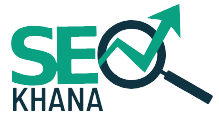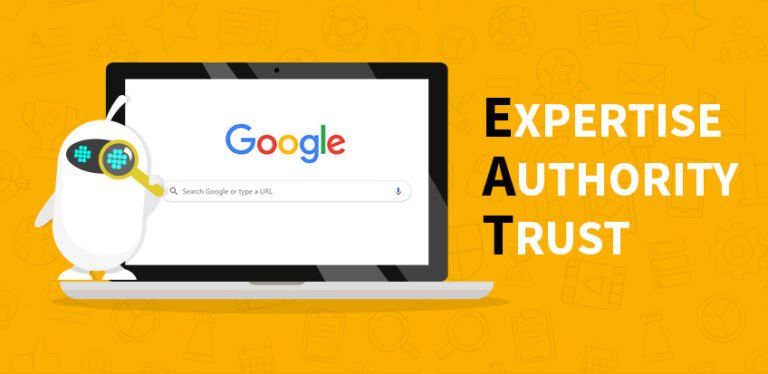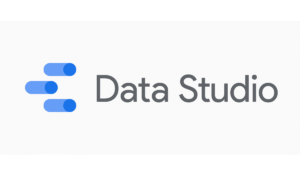In the ever-evolving world of search engine optimization, ranking high on Google is no longer just about using the right keywords, it’s about building real credibility and trust. That’s where E-A-T comes in: a critical concept introduced by Google to ensure that only high-quality, trustworthy content earns top positions in search results.
At SEO Khana, we understand that true SEO success depends on more than just technical performance. Our mission is to help businesses grow online by creating content that demonstrates Expertise, Authoritativeness, and Trustworthiness (E-A-T),the very pillars Google uses to evaluate the quality of your website.
In this article, we’ll explore everything you need to know about E-A-T, from what is E-A-T in SEO to how you can apply it to boost visibility, conversions, and long-term authority. Whether you’re managing a blog, e-commerce store, or service website, improving your Google EAT SEO score is essential, and SEO Khana is here to guide you every step of the way.
What is E-A-T in SEO?
If you’ve been exploring ways to improve your website’s visibility on Google, you’ve likely come across the term E-A-T. But what is E-A-T in SEO, and why has it become such a crucial factor in how your content ranks?
E-A-T stands for Expertise, Authoritativeness, and Trustworthiness. It’s a concept introduced by Google to evaluate the quality of content across the web, especially on websites that publish information that can impact a person’s health, finances, or well-being. These types of sites are often referred to as YMYL (Your Money or Your Life), and Google holds them to a higher standard.
So, what is E-A-T SEO really about? In simple terms, it’s Google’s way of determining whether your website can be trusted, whether the people behind your content are qualified, and whether your information is accurate and helpful. It’s not a direct ranking factor like keywords or backlinks, but it strongly influences how your content is assessed by Google’s algorithm and human quality raters.
The introduction of E-A-T as a key part of Google’s search quality guidelines reflects a shift in SEO strategy, eat for SEO is no longer optional. Brands, bloggers, and businesses alike must now focus on building credibility and publishing content that demonstrates real expertise.
In the sections that follow, we’ll break down each component of E-A-T, explore its impact on your SEO performance, and show you how to build a content strategy that aligns with Google’s trust-focused expectations.
What Does E-A-T Stand for in Google SEO?
In the world of SEO, content quality matters more than ever, and Google uses the concept of E-A-T to evaluate that quality. But what does E-A-T stand for in Google SEO, and why is it so important for your website’s visibility?
E-A-T is an acronym for:
1. Expertise
Expertise refers to the depth of knowledge and skill shown by the content creator. Google wants to see that your content is written by someone who truly understands the topic, whether that expertise is formal (like a doctor or lawyer) or experiential (such as a seasoned traveler writing travel guides). Content Creation Optimization that reflects real knowledge helps boost credibility in google eat seo evaluations.
2. Authoritativeness
Authoritativeness is about reputation. It means your website or brand is recognized by others in your field as a go-to source of information. Google looks at factors like backlinks from respected sites, mentions across the web, and even your authors’ credentials to assess whether your content is considered reliable and influential.
3. Trustworthiness
Trust is essential, especially on websites that ask for personal or financial information. Trustworthiness covers everything from having a secure domain (HTTPS) and clear privacy policies to using accurate, fact-checked content. Sites that are transparent and honest rank better in E-A-T for SEO.
Why Google Values Expertise in Content
As Google continues to refine its algorithm to serve users better, expertise has emerged as one of the most critical pillars of content quality. But why does Google care so much about it, and what does that mean for your SEO strategy?
At its core, Google’s mission is to deliver the most accurate, helpful, and reliable information for every search query. That’s why content written by individuals or organizations with clear expertise ranks higher. When Google identifies that a piece of content comes from someone with real knowledge or credentials, it gives that content more weight in the search results.
This is especially vital for YMYL (Your Money or Your Life) topics such as health, finance, legal advice, and safety. In these cases, low-quality or inaccurate information can have serious consequences. That’s why Google E-A-T SEO standards demand a higher level of expertise for these pages.
Here’s how expertise improves your SEO performance:
- Improves credibility in Google’s eyes.
- Boosts user trust and engagement, which indirectly improves rankings.
- Helps avoid algorithm penalties tied to poor or misleading information.
- Strengthens SEO trust signals, such as user reviews, citations, and links from other expert sources.
Whether you’re a brand, publisher, or individual content creator, showing expertise is essential for building trust online. It’s not enough to simply write well, your content must demonstrate real knowledge backed by experience, credentials, or verified insight.
Investing in expertise is more than just an SEO tactic, it’s a long-term strategy for building authority, trust, and visibility in your niche. That’s why E-A-T for SEO isn’t just a guideline; it’s the foundation of sustainable content marketing.
How to Improve E-A-T and Build Trust with Content
Understanding E-A-T is just the first step, putting it into practice is where the real impact happens. Whether you’re running a blog, an e-commerce platform, or a corporate website, knowing how to improve E-A-T can significantly strengthen your search rankings and overall online authority.
Google may not treat E-A-T as a direct ranking factor, but it relies heavily on indirect signals that influence how your content is perceived in terms of expertise, authority, and trust. These signals, often referred to as SEO trust signals, help determine whether your content deserves to rank among the top results.
Here are practical ways to improve your site’s E-A-T and build trust with content:
1. Publish Content by Real Experts
- Use contributors with proven qualifications or real-life experience.
- Include detailed author bios and credentials.
- Link to professional profiles like LinkedIn or published research when applicable.
2. Show Transparency and Credibility
- Add an “About Us” page detailing your company or brand’s background.
- Clearly display contact information, editorial guidelines, and privacy policies.
- Make sure your site uses HTTPS for user structured data protection.
3. Use High-Quality, Fact-Checked Information
- Always cite trustworthy sources (official sites, academic publications, etc.).
- Regularly update outdated content.
- Avoid clickbait or exaggerated headlines that erode user trust.
4. Encourage Positive User Signals and Engagement
- Showcase testimonials, case studies, or success stories.
- Add FAQ sections to address common user concerns.
- Respond to comments and feedback to show active engagement.
5. Leverage SEO Trust Signals
- Earn backlinks from reputable sites within your niche.
- Gain mentions on authoritative platforms, directories, or media outlets.
- Build your brand presence across the web to strengthen digital authority.
6. Maintain a Consistent Content Strategy
- Post regularly and follow a clear content schedule.
- Maintain a consistent tone, visual identity, and user experience across all pages.
- Avoid duplicate or thin content, which can harm perceived quality.
Improving your E-A-T doesn’t happen overnight, but every step you take to build trust with content puts you in a stronger position to earn Google’s recognition. When users and search engines alike see your site as expert, authoritative, and trustworthy, your content won’t just rank higher. it will convert better and inspire lasting loyalty. That’s why partnering with a skilled content creation agency can be a game-changer, helping you craft strategic, high-quality content that reinforces your credibility and boosts visibility.
E-A-T for Different Types of Websites
While E-A-T, Expertise, Authoritativeness, and Trustworthiness, is important for all websites, its application and significance can vary depending on the type of website and the content it delivers. Google evaluates each site based on the level of risk involved in delivering inaccurate or misleading information, which is why understanding your niche is essential when applying E-A-T principles.
Let’s explore how E-A-T works across different website categories:
1. Health & Medical Websites (High E-A-T Required)
For sites that offer health advice, medical guidance, or wellness content, E-A-T is absolutely critical. These are considered YMYL (Your Money or Your Life) pages because incorrect information could impact a person’s health or safety.
How to demonstrate E-A-T:
- Content should be written or reviewed by certified medical professionals.
- Display credentials clearly on author bios.
- Link to official sources (e.g., WHO, government health sites).
- Ensure content is fact-checked and regularly updated.
2. Financial & Legal Websites
Finance and law are also highly sensitive topics. Users depend on accurate, secure, and expert-driven information when making serious decisions about money, taxes, loans, or legal issues.
To improve E-A-T:
- Content must come from licensed professionals or credible institutions.
- Use disclaimers where appropriate.
- Provide trust signals like case studies, licenses, or certifications.
- Display transparent company information, terms, and policies.
3. E-commerce Websites
For online stores, trust and authority affect not only rankings but also conversion rates. Shoppers want to feel confident that they’re buying from a legitimate and reliable business.
E-A-T essentials for e-commerce:
- Use real product reviews and customer feedback.
- Include clear shipping, return, and privacy policies.
- Have a secure checkout system (SSL certificate).
- Feature “About Us,” contact information, and verified trust badges.
4. News & Media Sites
News sites must exhibit strong editorial standards and fact-checking practices. Spreading misinformation can damage public trust and lead to ranking penalties.
How to establish authority:
- Name and cite your reporters or journalists.
- Use reputable sources for your stories.
- Clearly show publishing and update dates.
- Maintain a strong editorial process and corrections policy.
5. Lifestyle, Travel, and Food Blogs
While these may not always be classified as YMYL sites, Google still expects a baseline of trust and knowledge. Demonstrating personal experience can be a powerful form of expertise in these categories.
Boosting E-A-T here includes:
- Sharing original photos, insights, and tips based on real-life experience.
- Engaging with your audience through comments and feedback.
- Providing transparent disclosures for affiliate content or sponsorships.
6. Educational Websites
For platforms offering tutorials, online courses, or academic content, demonstrating the credibility of instructors or sources is essential.
E-A-T tips for educational sites:
- Highlight instructor backgrounds and qualifications.
- Cite academic or industry-standard references.
- Use a structured content format that’s easy to verify and navigate.
Read more about
- internal linking and how it matter for SEO
- Click through rate
- feature snippets
Common Mistakes That Hurt Your E-A-T
While many businesses and content creators are now focusing on building E-A-T (Expertise, Authoritativeness, and Trustworthiness), there are still frequent missteps that can damage your SEO efforts. Understanding these common mistakes that hurt your E-A-T is essential for protecting your site’s visibility and reputation in Google’s eyes.
Here are the most frequent issues that undermine your Google E-A-T SEO performance:
1. Publishing Content Without Expert Input
One of the biggest mistakes is publishing content on complex or sensitive topics, like health, finance, or law, without involving a qualified expert. Google expects credible authorship, especially for YMYL (Your Money or Your Life) topics.
Avoid it by:
Including expert authors, medical/legal reviewers, or contributors with real-life experience and credentials.
2. Lack of Author Transparency
Anonymous content or blog posts without author bios make it difficult for users (and Google) to verify the expertise behind the information. If readers don’t know who wrote the content, it’s harder to build trust.
Fix it by:
Adding detailed author bios, credentials, and links to external professional profiles (like LinkedIn).
3. Outdated or Inaccurate Information
Even high-quality content loses value if it isn’t maintained. Factual errors, outdated statistics, or expired recommendations can erode trust and signal poor content management.
Improve it by:
Regularly updating key articles, citing recent sources, and reviewing content for accuracy.
4. Thin, Low-Quality, or AI-Generated Content
Publishing content that lacks depth, originality, or useful insight can harm both user trust and SEO rankings. Google can identify shallow pages that don’t provide value.
Avoid it by:
Creating in-depth, research-backed content that offers unique perspectives or solutions, not just summaries.
5. No Trust Signals on the Website
Websites without SEO trust signals such as HTTPS security, privacy policies, contact info, or real customer reviews may appear suspicious to users and search engines.
Fix it by:
Implementing visible trust signals, improving site security, and using verified reviews and testimonials.
6. Overuse of Affiliate Links Without Transparency
If your content is heavily monetized through affiliate links without proper disclosure, it can appear biased and untrustworthy, especially if there’s no editorial value.
Avoid it by:
Clearly labeling affiliate relationships and ensuring content provides independent, helpful insight.
7. Negative Online Reputation
Bad reviews, customer complaints, or misleading content can hurt your site’s authoritativeness and trustworthiness. Google factors in brand reputation when evaluating E-A-T.
Improve it by:
Responding to feedback, offering resolutions, and encouraging satisfied customers to leave positive reviews.
Tools to Measure and Monitor E-A-T
While E-A-T (Expertise, Authoritativeness, and Trustworthiness) isn’t a direct ranking factor with a numeric score, there are several indirect indicators and metrics that can be monitored using various SEO and brand analysis tools. These tools help you assess how well your content and website align with Google’s E-A-T SEO guidelines, and where improvements are needed.
Here are the top tools and platforms to help you measure and monitor E-A-T:
- Google Search Console
- Purpose: Tracks organic search performance, click-through rates, index coverage, and page experience signals.
- E-A-T Insight: A sudden drop in performance could suggest content quality or trust issues. Use this to monitor how Google views your site’s overall health and authority.
- Google Analytics
- Purpose: Analyzes user behavior, bounce rates, session duration, and engagement.
- E-A-T Insight: High bounce rates or low engagement may indicate that users don’t trust your content or find it lacking in expertise.
- Ahrefs / SEMrush / Moz
- Purpose: Provides domain authority scores, backlink profiles, keyword rankings, and competitor insights.
- E-A-T Insight:
- High-quality backlinks = strong authoritativeness.
- Mentions from trusted sources boost credibility.
- Site audits can help identify technical and content issues impacting trustworthiness.
- Brand24 / Mention / Google Alerts
- Purpose: Tracks brand mentions, sentiment analysis, and online reputation.
- E-A-T Insight: Frequent positive mentions from reputable websites improve authority. Negative reviews or misinformation may signal trust issues that need addressing.
- Site Reputation Checkers (Trustpilot, Better Business Bureau, Reviews.io)
- Purpose: Measures online customer satisfaction and public trust.
- E-A-T Insight: Verified reviews and ratings help build trust signals that reinforce your site’s trustworthiness in both user perception and Google’s quality evaluations.
- Screaming Frog SEO Spider
- Purpose: Crawls your website to audit content, metadata, links, and technical SEO.
- E-A-T Insight: Helps you identify missing author bios, poor internal linking structure, outdated content, or thin pages,factors that can weaken your E-A-T signals.
- Clearscope / Surfer SEO / MarketMuse
- Purpose: Content optimization tools that analyze top-ranking content and provide topic coverage recommendations.
- E-A-T Insight: Ensures your content meets industry expectations and covers key topics with depth and clarity,demonstrating expertise and authority.
Bonus Tip: Manual Evaluation
Beyond tools, conduct periodic manual content audits:
- Is the author clearly identified?
- Are credentials or qualifications visible?
- Are claims supported with trusted sources?
- Is the site easy to navigate and secure?
Conclusion
As Google continues to prioritize content quality, Expertise, Authoritativeness, and Trustworthiness, has become a fundamental element of successful SEO strategies. Whether you’re running a blog, a business website, or an e-commerce platform, understanding and applying E-A-T principles is no longer optional, it’s essential.
From ensuring expert authorship to building credible backlinks and fostering trust through secure, transparent website practices, every improvement you make enhances how both users and search engines view your brand. And while E-A-T may not be a direct ranking factor, it influences nearly every signal Google uses to determine whether your content deserves to be seen.
At SEO Khana, we specialize in helping brands like yours build trust, authority, and long-term visibility in search results. Our team is dedicated to crafting content and strategies that align with Google’s evolving standards,so your business not only ranks better but earns lasting credibility in your industry.
If you’re ready to boost your online presence with strong, E-A-T-driven SEO strategies, let SEO Khana guide your path to the top of Google.
Frequently Asked Questions (FAQ)
- What is E-A-T in SEO?
E-A-T stands for Expertise, Authoritativeness, and Trustworthiness. It’s a concept used by Google to assess the quality and credibility of content, especially for topics that impact health, finance, or safety. - Is E-A-T a direct ranking factor?
No, E-A-T is not a direct ranking factor like page speed or backlinks. However, it influences how Google evaluates content quality, which plays a major role in determining search rankings. - Why is E-A-T important for my website?
Google wants to deliver helpful, reliable information to users. If your content lacks expertise or credibility, it may be outranked by competitors with stronger E-A-T,even if your technical SEO is solid. - How can I improve E-A-T on my site?
- Publish content by qualified experts.
- Add detailed author bios and credentials.
- Use secure (HTTPS) and transparent website practices.
- Earn backlinks from trusted sources.
- Keep your content up-to-date and factually accurate.
- What types of websites need to focus most on E-A-T?
Websites that cover Your Money or Your Life (YMYL) topics,like healthcare, legal advice, finance, or safety,are held to the highest E-A-T standards. However, all websites can benefit from improved trust and authority.
- Can small businesses or bloggers still rank well with E-A-T?
Absolutely. Even if you’re not a well-known brand, you can build E-A-T by demonstrating personal expertise, providing valuable information, and gaining trust from your audience over time. - What are SEO trust signals?
SEO trust signals are elements that indicate your website is safe, credible, and reliable,such as HTTPS encryption, clear contact details, reviews, third-party mentions, and consistent content quality.






